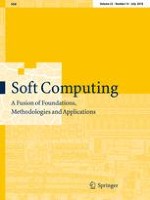07-06-2017 | Methodologies and Application
Distance-based nonlinear programming models to identify and adjust inconsistencies for linguistic preference relations
Published in: Soft Computing | Issue 14/2018
Log inActivate our intelligent search to find suitable subject content or patents.
Select sections of text to find matching patents with Artificial Intelligence. powered by
Select sections of text to find additional relevant content using AI-assisted search. powered by
